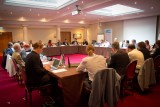UN representatives and parliamentarians from 17 countries* met with disarmament experts on Saturday 24 August for a Framework Forum roundtable to discuss the exciting new United Nations process for multilateral disarmament – the Open Ended Working Group on Taking Forward Multilateral Nuclear Disarmament Negotiations (OEWG), which has been meeting at the Palais de Nations in Geneva in May, June and August before reporting back to the United Nations General Assembly this October.
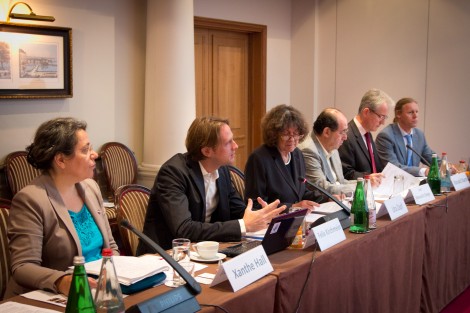
Xanthe Hall, Felix Kirchmeier, Uta Zapf, Manuel Dengo, Ronald Sturm and Alyn Ware
The Framework Forum event, co-hosted by Parliamentarians for Nuclear Nonproliferation and Disarmament (PNND), Middle Powers Initiative (MPI) and the Friedrich-Ebert-Stiftung (FES), focused on how to ensure the OEWG is effective in overcoming the 17-years of paralysis in multilateral nuclear disarmament negotiations, and on how to elevate the nuclear disarmament issue up the political ladder.
Participants were welcomed with an instructive and illuminating video message from Tadatoshi Akiba, Chair of the Middle Powers Initiative and former President of Mayors for Peace.
Speaking from the Atomic Bomb Dome in Hiroshima, Mr Akiba remarked that the use of a nuclear weapon against Hiroshima ‘is an important reminder of the catastrophic impact of their use and the imperative to achieve nuclear abolition.’
Mr Akiba outlined the purpose of the Framework Forum to assist governments ‘establish the necessary framework to achieve and maintain a world without nuclear weapons’ as agreed by all States Parties to the Nuclear Nonproliferation Treaty (NPT) at the 2010 NPT Review Conference.
Mr Akiba called for ‘increased action by governments – both non-nuclear and nuclear-armed’ to implement this agreement, including through ‘ preparatory work on a range of the elements or building blocks for a nuclear weapons free world, and the commencement of multilateral nuclear disarmament negotiations leading to a nuclear weapons convention or package of agreements.’
‘The Open Ended Working Group has opened the door to deliberations, cooperative action, preparatory work and negotiations. Civil society actors including parliamentarians, mayors, policy analysts and campaigners – if adequately resourced - are able to assist you [governments] walk through this door and to bring other key States – including the nuclear Weapon States – with you.’
Mr Akiba's welcome was followed by superb presentations from Manuel Dengo (Chair of the OEWG), Xanthe Hall (IPPNW/PNND/MPI), Ronald Sturm (Head of Nuclear Security, Disarmament and Non-proliferation Unit, Austrian Federal Ministry for European and International Affairs), Jarmo Sareva (Deputy Secretary-General of the Conference on Disarmament ), Jonathan Granoff (President of the Global Security Institute), Marc Finaud (Geneva Centre for Security Policy and UNIDIR), Tarja Cronberg MEP (Chair of PNND European Parliament Section) and Uta Zapf (PNND Co-President).
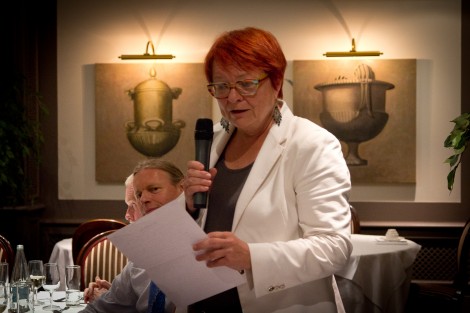
Tarja Cronberg MEP
Ambassador Dengo, who also features in the Open the door video shown at the start of the second session(see below), reflected on the positive climate of the OEWG meetings where different perspectives and proposals have been discussed in a cordial manner with genuine good faith efforts to reach common ground.
Ronald Sturm gave a personal reflection of how humanitarian disasters – no matter where they occur – can impact on people everywhere. As a young Red Cross volunteer in Austria in the 1980s, for example, Mr Sturm was faced with the tragic results of chemical weapons use in the Iraq/Iran war as some of the victims were flown to Austria for treatment. Sturm noted that people today are complacent about the possibility of nuclear weapons use and their humanitarian consequences including long-term effects like a nuclear famine – perhaps because they feel it could not happen in their country – but that this complacency is truly misplaced, because the effects would be global.
Xanthe Hall introduced the concept of change management as an approach that could assist the blocked multilateral process. In particular, change management would address institutional as well as policy blocks to progress and consider the changing political environment - as the 21st century security environment is very different to the 20th Century environment which gave rise to nuclear deterrence policies. In addition, a change management approach would help identify ways to overcome ‘change-related fear’, such as the psychological fear of countries moving from reliance on nuclear deterrence to one of cooperative security.
Ms Hall cited analysis presented by Nancy Gallagher to the February 2013 Framework Forum in Berlin on the concept of Strategic Stability. ‘The Strategic Stability doctrine arose in a bi-polar world where some balance of power between two opposing sides could theoretically be possible. Such a concept is nonsense in a multi-polar world. Yet it continues to frame - and limit - disarmament negotiations between the nuclear weapon States. From a strategic stability framework, insecurity arises as numbers of nuclear weapons come down and ‘balance of power’ is less achievable. Thus, getting to zero is all but precluded.’
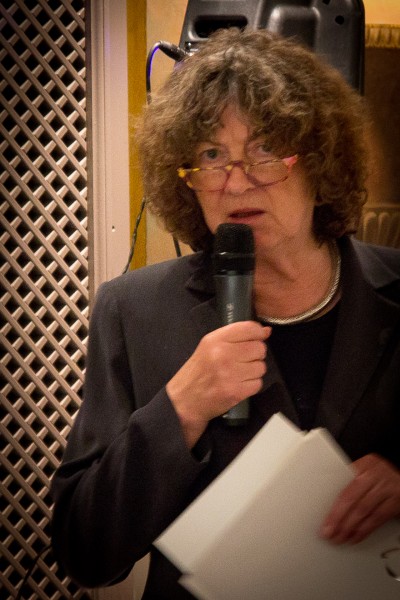
Uta Zapf, Chair of the Bundestag (German Parliament) Subcommittee on Disarmament and Arms Control
Uta Zapf picked up on this theme, and called for a greater shift from military security and it’s elusive search for balance of power, towards common and cooperative security which relies more on common legal and political mechanisms to resolve conflicts and address security issues. She noted that this has been the approach of the Organisation for Security and Cooperation in Europe - which was successful decades ago in achieving the Treaty on Conventional Forces in Europe, but needs reinvigorating to enhance the cooperative security framework.
Marc Finaud, also addressed the cooperative security framework, noting that shifting nuclear weapons-possessing States - and those under extended nuclear deterrence arrangements - away from their reliance on nuclear weapons will require a range of approaches, as the reasons for relying on nuclear weapons differ. In some cases nuclear deterrence is related to unresolved regional conflicts - in other cases, to more global issues. Mr Finaud indicated that engagement of the OEWG with both the governments and key civil society actors of the countries relying on nuclear weapons will be important to address their security concerns in order to enable them to abandon nuclear deterrence and join a nuclear-weapons-free regime.
Jarmo Sareva dubbed the OEWG as ‘diplomats for disarmament’, indicating the possibilities, but also the responsibilities, of the OEWG participating countries to ensure they use the forum to make progress. Mr Sareva highlighted the importance of building political will – as without it no forum can succeed. However, he also noted that insufficient political will is no excuse for inaction – that the current blocks to multilateral nuclear disarmament are not created by God but by human choice. Sareva suggested that governments participating in the UN High Level Meeting in New York on 26 September refrain from political slogans criticising others, but instead use the opportunity to focus on the common aspiration for a nuclear weapons free world, and support the concrete proposals arising through the OEWG for progress on both initial measures and a comprehensive framework or roadmap for a nuclear weapons free world.
Tarja Cronberg MEP, who serves as the Chair of the European Parliament Contact Group with Iran, noted that there are various reasons for States to seek, acquire or hold onto nuclear weapons including the prestige, status or political power that they can confer. These reasons need to be considered when developing approaches to prevent proliferation or to move nuclear-armed States towards nuclear disarmament. In the case of Iran, for example, the current approach of the P5 and Germany (five nuclear weapon States and one nuclear-weapons hosting State) leading the negotiations provides a framework which could reinforce the status and political power of nuclear weapons rather than reducing it. A better approach may be to elevate the political status of being non-nuclear by giving a more leading role to non-nuclear weapons States in the negotiations. The successful Brazil-Turkey negotiations with Iran in 2010 (unfortunately scuttled by the P5) and the promising mediating role of Kazakhstan in the latest round of talks indicates the potential of such an approach.
Jonathan Granoff, by video message from the United States, called on the governments to elevate the issue up the political ladder – especially at the UN High Level Meeting in September – perhaps by stating strongly at the meeting that ‘There is no national boundary to the fall out of a nuclear blast. My citizens and all citizens have a right to a nuclear weapons free world.'
Mr Granoff also called on governments, academics and civil society to advance the ‘realism’ of the 21st Century. ‘Realism requires commitment to address the entire set of existential threats to the survival of civilization such as protecting the climate, the health of the oceans and rainforests as living systems, and a security system that does not generate the uses of science and technology to develop and deploy instruments of indiscriminate horrific destruction. Such realism means cooperation in achieving public common goods of the highest value, made more difficult to be obtained in a nuclear apartheid world.’
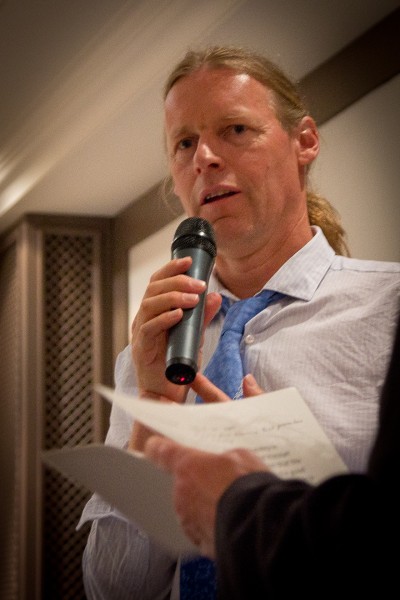
Alyn Ware
Alyn Ware, PNND Global Coordinator, presented a statement from Jaroslaw Walesa (Deputy-Chair of PNND European Parliament Section) who had hoped to attend the forum. Mr Walesa recently worked with Tarja Cronberg, Global Zero and PNND to secure the signatures of over 380 members of the European Parliament for a Written Declaration supporting the Global Zero plan for the elimination of nuclear weapons. He noted that parliamentarians have a unique opportunity to engage with parliamentary colleagues from both non-nuclear and nuclear weapon States and then use this to input into practical policy steps to achieve a nuclear weapons free world.
The discussion from the participants at the forum was lively and productive focusing on a range of process and substantive issues. Some key comments included:
- The OEWG final report should have specific recommendations, or provide an indication of strength of support for specific proposals, rather than merely being a compendium of proposals. If consensus is not possible on this, it might be necessary for the report to be submitted by the Chair without seeking adoption by the OEWG;
- Most countries have already rejected nuclear deterrence for their security. Non-NWS can encourage NWS (and allies under extended nuclear deterrence) to make the decision necessary to phase out or abandon reliance on nuclear weapons;
- OEWG has opened the door to deliberations leading to negotiations for a nuclear weapons free world. Prior to the OEWG, only civil society actors were discussing the details on how to achieve a nuclear weapons free world. Now governments are discussing this in the OEWG which is a huge step forward;
- The OEWG is receiving considerable support from civil society – and especially from parliamentarians through the Inter Parliamentary Union (which has chosen to focus on the issue of achieving a nuclear weapons free world), PNND and regional parliamentary bodies such as the Parliamentary Assembly of the Organisation for Cooperation and Security in Europe (which has adopted a resolution supporting the OEWG).

The participants were also treated to an inspiring Open the door compilation video produced by the Basel Peace Office from approximately 40 video clips sent in from policy-makers, parliamentarians, mayors, disarmament experts, children and youth from around the world opening doors to a nuclear weapons free world and walking through. See www.openthedoor2013.org for the individual video clips.
The Basel Peace Office thanks the Geneva branch of the Friedrich-Ebert-Stiftung for its logistical and financial support to enable us to organise the Framework Forum roundtable in Geneva.
* Delegates from the following countries participated in the Framework Forum roundtable meeting - Algeria, Austria, Belgium, Costa Rica, Czech Republic, Egypt, Germany, India, Ireland, Japan, Slovakia, Sweden, Switzerland and Turkey, along with parliamentarians from Finland, Germany and Scotland and a number of disarmament experts and NGO representatives.
Written presentations:
- Welcome comments, Tadatoshi Akiba, Chair of the Middle Powers Initiative
- Pushing Forward and Pushing Upward, Jonathan Granoff, President Global Security Institute
- Achieving change, Xanthe Hall, IPPNW Germany
- Message to PNND Framework Forum, Jaroslaw Walesa MEP, Deputy Chair of PNND European Parliament Section
- Remarks to the Framework Forum roundtable on the UN OEWG, Jarmo Sareva, Director, Geneva Branch, UNODA
